RELATED CONTENT
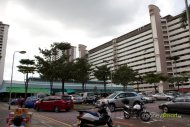 View PhotoS’pore’s Housing Oversupply, and What You Can Do About It
View PhotoS’pore’s Housing Oversupply, and What You Can Do About It
Last night I had a vision: I saw the sky darken, lit only by flames of burning money. In the distance, towering condos leered at mewling investors, who shook their fists in rage. Which is either the most cinematic property analysis ever, or a direct result of eating mouldy Cheetos. Doesn’t matter, both mean the same thing: A housing oversupply is looming. In this article, I examine the causes, and what you can do about it:
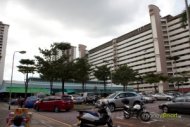
"Take a good look at that sky. Once we're done building you'll never see it again."
What’s This About An Oversupply?
Wing Tai Chairman, Mr. Cheng Wai Keung, sees it coming. Simply put, we may have too many available houses entering the market. If you’re a potential buyer, you may now commence your lewd victory dance*. If you’re a seller, act fast; or you’re going feel like a jerk who just opened the 400th laksa stall in Katong.
*Do it in public, because Singaporeans are known for their sense of humour.
The causes of the oversupply are:
- Buyers’ Herd Mentality
- Low Interest Rates
- We Made Developers Aggressive
- Harsh Transition From Past Undersupply

Of course I can deal with this. I used to be a property developer.
1. Buyers’ Herd Mentality
Try this: At any social gathering, raise the issue of property. I guarantee it takes five minutes, tops, before some blowhard explains ”How my property made me so damn rich”. If it’s not them, it’s someone they know.
This “property cures everything” notion has become a disease. Thanks to the hype, everyone’s rushing to throw money at the first patch of dirt they find. Doesn’t matter if the walls are dried dog poop and the architect was an orang-utan with a crayon; Singaporeans will buy it.
Case in point? Even nonsense units like OCR (out of central region) shoebox flats are selling well. And condos are bought regardless of price (see Sky Habitat).
Since the herd mentality translates to high demand, developers have been building non-stop. And now, all their products are going to hit the market at the same time. Coupled with a crop of 8000 HDB flats, property prices are going to droop like a fat man on a treadmill.
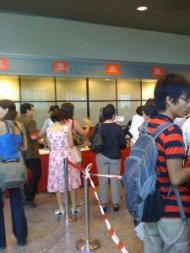
"No Ma'am, you can't pre-order any projects we might start in 2040."
What to Do?
If you’re a buyer, wait a while before buying. When more houses flood the market, your desired property may drop in price. Even if it doesn’t, you’ll have a wider range of alternatives.
If you’re selling, you better move fast. If you find you’re too late, and prices have started to drop, then sit tight and hold; you’ll have to wait for the next upswing.
2. Low Interest Rates
If you’ve been tracking the 110+ plus packages on the home loans market, you…need to get a hobby. A documentary on cow grass would be more exciting. But at least you’d know the rates hover near 1%, which is fantastically low.
And because of that low rate, Singaporeans have little reason to hold back. The rate of capital appreciation far exceeds the home loan interest. Property investor Charlie Sng agrees:
“If you choose the right property, it will more than pay for itself. If the value of your property is growing by 5 or 6% every year, but your loan interest is just 1.2%, then you are making a lot of money.“
But will oversupply change this? Mr. Sng says:
“There is a lot of liquidity in Asia right now, especially Singapore. The oversupply will not change that. I believe interest rates will remain low.”
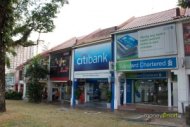
Maybe I need a better plan than "Whichever bank I can shout to from Starbuck's".
What to Do?
Take advantage of the cheap bank loans. If you haven’t changed your loan package in a while, now is good time to refinance. Visit sites like SmartLoans.sg for comparisons. However, do not feel rushed into taking out a new loan now. Chances are, you’ll still get a comparable deal later (even if housing prices drop).
3. We Made Developers Aggressive
Singaporeans are more willing to invest in a nice house than in retirement funds. We are undiscerning about property price, and encourage developer aggression. Mr. Sng feels that:
“Developers have been so aggressive at bidding for land, so aggressive and…start projects one after another. Why? Because they have the confidence that Singaporeans will buy.
Singaporeans will buy no matter the price, because their retirement security is not their job or their business; their retirement security is their house. And they will put everything into it, no problem.
But of course, houses are the same as cars in Singapore. There is limited space. When developers build so aggressively, there will definitely be oversupply.”
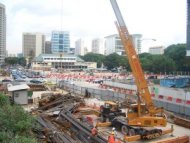
"House? We're building the pit for the developers' death match."
What to do?
If you’re a long term home owner, oversupply shouldn’t be a worry. There will always be cyclical dips in the property market. Mr. Sng says that:
“Don’t worry; if you are a true home owner and not a speculator, oversupply is more or less irrelevant to you. Five, ten years…probably a lot less…and your property will go up again.”
Mr. Sng also adds that oversupply can be an opportunity to upgrade:
“You can also sell now when prices are high. Later when prices drop, you will be able to get another nicer property. If you can time it right, this is a good opening.”
4. Harsh Transition From Past Undersupply
Singapore’s property market is like a car with two speeds: Too fast, and not moving. If you’re riding in it, prepare to be jerked around like a first time home buyer in a bank office.
When we faced undersupply (as far back as the late 90′s), homes were too few and too expensive. Now, we’ve over-compensated. This isn’t the first time, nor will it be the last: Population and property are not exact sciences.
Still, we can be grateful that an oversupply will hit the rich (who can afford it) before the poor.
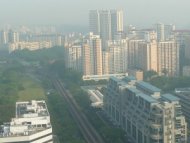
"In my day there were no flats here. All jungle. And you had to kill your own brontosaurus for meat."
What to do?
Visit the URA building and look at the master plan; that’s the best way to predict oversupply.
You’ll also see where the future parks, MRT stations, and malls are. Don’t cling to fast, easy assumptions about different districts. For example, did you know that Bedok will host the world’s first arena for giant robot duels?
I’m totally not making that up to boost my home property price.

